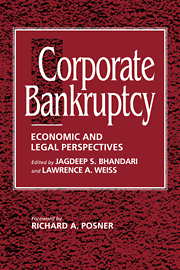Book contents
- Frontmatter
- Contents
- List of tables and figures
- Foreword by the HONORABLE RICHARD A. POSNER
- Preface
- Part I The role of credit
- Part II Bankruptcy as a reflection of the creditors' implicit bargain
- 4 A world without bankruptcy
- 5 Bankruptcy, nonbankruptcy entitlements, and the creditors' bargain
- 6 Translating assets and liabilities to the bankruptcy forum
- 7 Bankruptcy policy
- 8 Loss distribution, forum shopping, and bankruptcy: A reply to Warren
- Part III Beyond the basic creditors' bargain
- Part IV Workouts or bargaining in the shadow of bankruptcy
- Part V Alternatives to bankruptcy and the creditors' bargain
- Part VI Experience of other countries
- Index
8 - Loss distribution, forum shopping, and bankruptcy: A reply to Warren
Published online by Cambridge University Press: 10 December 2009
- Frontmatter
- Contents
- List of tables and figures
- Foreword by the HONORABLE RICHARD A. POSNER
- Preface
- Part I The role of credit
- Part II Bankruptcy as a reflection of the creditors' implicit bargain
- 4 A world without bankruptcy
- 5 Bankruptcy, nonbankruptcy entitlements, and the creditors' bargain
- 6 Translating assets and liabilities to the bankruptcy forum
- 7 Bankruptcy policy
- 8 Loss distribution, forum shopping, and bankruptcy: A reply to Warren
- Part III Beyond the basic creditors' bargain
- Part IV Workouts or bargaining in the shadow of bankruptcy
- Part V Alternatives to bankruptcy and the creditors' bargain
- Part VI Experience of other countries
- Index
Summary
Elizabeth Warren has presented a view of bankruptcy that, while rarely as well articulated, is widely shared. The virtues of Warren's paper, like those of the rest of her work, are easy to identify. Her style is sharp and penetrating. She writes with insight and wit, and she demands that all analysis be held against the light of empirical data – the brighter the better. Warren has put forward a critique of the work I have done with Thomas Jackson that merits a response both because of its own strengths and because it captures misgivings other traditional bankruptcy scholars have shared about our work.
There is much in Warren's view of bankruptcy policy that I admire and agree with. Indeed, to understand our disagreement, it is necessary first to recognize the extent of our common ground. Warren and I agree that, in the main, existing bankruptcy law is consistent with sound bankruptcy policy. The trustee should have the powers of a hypothetical lien creditor; the trustee should be able to set aside voidable preferences and reject executory contracts; creditors (including secured creditors) should be stayed from asserting their substantive claims after the filing of a bankruptcy petition. Warren and I also agree that victims of nonmanifested torts should have their rights against the firm recognized in bankruptcy.
On what in my view is a different front, Warren and I also think existing laws do not adequately protect many, such as workers, who are affected when a firm fails.
- Type
- Chapter
- Information
- Corporate BankruptcyEconomic and Legal Perspectives, pp. 95 - 108Publisher: Cambridge University PressPrint publication year: 1996



